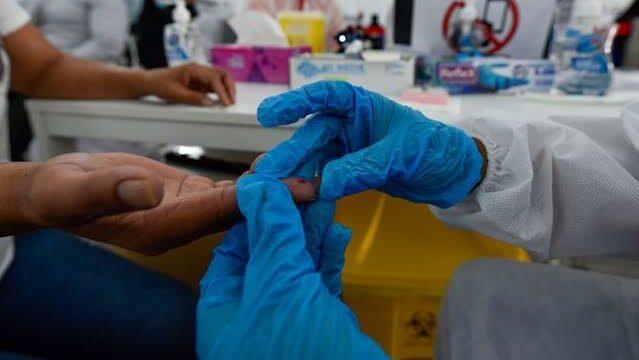DPI Test in Dubai : The Dubai Police, one of the most innovative and forward-thinking law enforcement agencies in the world, has continually embraced new technologies and practices to improve security and enhance the safety of both residents and visitors. One of the measures that have become increasingly important in ensuring public safety in Dubai is the DPI test, or Detection of Psychoactive Substances and Impairment test. This test is designed to identify drivers who may be under the influence of drugs or alcohol and to help authorities detect impairment that could lead to dangerous driving situations.
In response to growing concerns over road safety and the impact of psychoactive substances on driving behavior, Dubai introduced the DPI test as part of its broader efforts to combat driving under the influence (DUI) and improve overall traffic safety. The introduction of this test has been a significant step forward in promoting safe driving practices, reducing accidents, and safeguarding the public.
This article explores the DPI test in Dubai, its purpose, how it works, its location, and the importance of its implementation in maintaining the safety of roads in the UAE. Additionally, we will look at the role of technology in the development and success of this initiative and how it supports Dubai’s commitment to being a leader in road safety and law enforcement.

What is the DPI Test?
The DPI test is a diagnostic procedure used to detect the presence of psychoactive substances in a person’s body. These substances include alcohol, drugs, and other compounds that impair cognitive and motor functions, making it dangerous for individuals to operate a motor vehicle. The test primarily targets drivers who may be under the influence of these substances, offering law enforcement a quick and non-invasive way to assess their impairment.
The DPI test works by analyzing a sample of a person’s breath. This sample is then tested for the presence of psychoactive substances. The test is based on the principle that these substances affect a person’s ability to drive, impairing their judgment, reaction time, and overall coordination, all of which significantly increase the risk of accidents.
The test is often conducted at roadside checkpoints or during traffic stops when law enforcement officers suspect a driver of being impaired. It serves as an immediate and effective method of screening for substance abuse, enabling authorities to take appropriate action without needing a more invasive or time-consuming procedure.

Purpose and Importance of the DPI Test
The introduction of the DPI test in Dubai has been a crucial step in addressing the growing concerns about road safety. The UAE has one of the highest rates of traffic-related fatalities in the region, and a significant number of these accidents are attributed to impaired driving. The DPI test was implemented as part of a broader strategy to reduce traffic accidents and fatalities, particularly those resulting from drug and alcohol abuse.
- Promoting Road Safety: The primary purpose of the DPI test is to ensure that drivers are not under the influence of substances that impair their ability to drive safely. The test provides a quick, non-invasive means of identifying impaired drivers, thus reducing the risk of accidents caused by substance abuse.
- Reducing Traffic Accidents: Driving under the influence of drugs or alcohol is a major contributor to road accidents worldwide. By identifying impaired drivers early on and removing them from the roads, the DPI test helps prevent accidents and ensures safer travel for all.
- Deterring Impaired Driving: The implementation of the DPI test also serves as a deterrent to those considering driving under the influence. Knowing that they could be randomly tested for impairment helps to discourage individuals from engaging in dangerous behavior.
- Supporting Law Enforcement: The DPI test provides law enforcement officers with a reliable tool to identify drivers who may be impaired, making it easier for them to enforce traffic laws and keep the streets safe.
How Does the DPI Test Work?
The DPI test works by detecting the presence of psychoactive substances in a driver’s system. The process is quick, efficient, and non-invasive. Here is an overview of how the test works:
- Breath Sample Collection: During a traffic stop or at a roadside checkpoint, a law enforcement officer may request that a driver undergo a DPI test. The driver is asked to breathe into a specialized device that is designed to capture a breath sample.
- Analysis of Breath Sample: Once the sample is collected, the device analyzes it for the presence of specific substances that may indicate impairment. The test is sensitive to alcohol, narcotics, and other drugs that affect a person’s ability to operate a vehicle safely.
- Results: The results of the test are typically available within minutes, providing law enforcement officers with immediate feedback. If the test detects the presence of alcohol or drugs in a driver’s system, the officer may proceed with further investigation or arrest the individual if necessary.
- Follow-Up Procedures: In the event that the DPI test indicates impairment, the driver may be subject to additional testing, such as a blood or urine test, to confirm the exact levels of substances in their system. Depending on the results, the driver may face penalties, including fines, license suspension, or even imprisonment.
The entire process is designed to be fast, efficient, and minimally disruptive, ensuring that drivers can be tested quickly without causing significant delays to traffic flow. The technology used in DPI tests is highly accurate, providing reliable results that support the efforts of law enforcement in making the roads safer.
Locations for DPI Testing in Dubai
Dubai is known for its modern infrastructure and commitment to technological innovation, and the DPI test is no exception. The test is conducted at various locations across the city, ensuring that it can be administered to drivers in both urban and suburban areas. The main locations where DPI tests are conducted include:
- Roadside Checkpoints: Law enforcement authorities in Dubai frequently set up roadside checkpoints where random testing is conducted. These checkpoints are strategically placed in areas with high traffic volumes and are often set up during peak hours to catch impaired drivers.
- Traffic Stops: If a driver is pulled over for a routine traffic violation, the officer may ask the driver to undergo the DPI test if they suspect impairment. Officers are trained to look for signs of intoxication, such as erratic driving behavior, slurred speech, or the smell of alcohol.
- High-Risk Areas: DPI tests are also frequently conducted in areas where traffic accidents are more likely to occur, such as highways, intersections, and busy roads. These locations are chosen based on traffic patterns and accident statistics, allowing authorities to target high-risk areas for testing.
- Major Events and Celebrations: During major events, public holidays, and celebrations where alcohol consumption may be higher, DPI testing is often increased. Authorities may set up temporary checkpoints near popular venues, such as hotels, clubs, and concert halls, to test drivers for impairment before they take to the road.
- Cruise Ship Terminals and Ports: Given the popularity of Dubai as a tourist destination, cruise ships and ports are other common locations for DPI testing. Visitors to the UAE who have been drinking alcohol on their cruise or in the city may be subject to testing before they drive.
Consequences of Failing the DPI Test
Failing the DPI test in Dubai can have serious consequences. The UAE has strict laws regarding driving under the influence of alcohol or drugs, and penalties are severe. If a driver fails the test, they may face:
- Fines: Drivers who fail the DPI test may be issued fines, depending on the severity of the impairment and the type of substance detected.
- License Suspension: Individuals who are caught driving under the influence may have their driving licenses suspended for a period of time, which can range from a few months to several years.
- Imprisonment: In some cases, drivers who fail the DPI test and are found to be under the influence of drugs or alcohol may face imprisonment.
- Criminal Charges: Driving under the influence can result in criminal charges, particularly if the impaired driving leads to an accident or injury.
These penalties serve as a deterrent, encouraging drivers to make responsible decisions before getting behind the wheel.
Conclusion
The DPI test in Dubai plays a critical role in ensuring road safety and promoting responsible driving. By providing a fast, efficient, and accurate method for detecting impaired drivers, the test helps authorities to prevent accidents and save lives. With the support of advanced technology and strategic testing locations, Dubai’s law enforcement continues to work tirelessly to create safer roads for residents, visitors, and tourists alike. As a global leader in innovation and public safety, Dubai’s implementation of the DPI test sets a strong example for other cities and countries to follow in combating impaired driving.
Do follow Uae stories for more Updates
Port Rashid COVID Test: A Vital Step in Ensuring Public Safety and Smooth Operations













